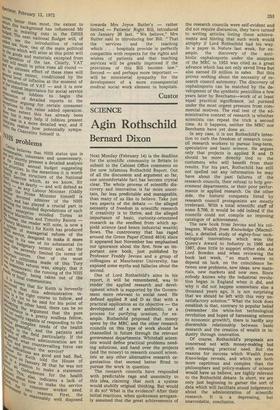SCIENCE
Agin Rothschild
Bernard Dixon
Next Monday (February 14) is the deadline for the scientific community in Britain to submit to the Cabinet Office comments on the now infamous Rothschild Report. Out of all the discussion and argument so far, one uncomfortable fact has become crystal clear. The whole process of scientific discovery and innovation is far more uncertain, far less predictable and manageable, than many of us like to believe. Take just two aspects of the debate — the alleged necessity of freedom in scientific research if creativity is to thrive, and the alleged importance of basic, curiosity-orientated research as the seedbed from which appield science (and hence industrial wealth) flows. The controversy that has raged around the Green Paper (Cmnd 4814) since it appeared last November has emphasised our ignorance about the first. Now an important new book, just published by Professor Freddy Jevons and a group of colleagues at Manchester University, has exposed some myths and fallacies about the second.
One of Lord Rothschild's aims in his report, it will be remembered, was to render the applied research and development which is supported by the Government more relevant to social need. He defined applied R and D as that with a practical application as its objective — the development of a new antibiotic, or a process for purifying uranium, for example. Rothschild proposed that money spent by the MRC and the other research councils on this type of work should be channelled in future through the relevant government departments. Whitehall scientists would define practical problems needing solutions, and hand over the projects (and the money) to research council scientists or any other alternative research organisation that seemed better fitted to pursue the work in question.
The research councils have responded with predictable rage •and unanimity to this idea, claiming that such a system would stultify original thinking. But would it do so? What is the evidence? After their initial reactions, when spokesmen arrogantly assumed that the great achievements of the research councils were self-evident and did not require discussion, they have turned to writing articles listing these achievements and hinting that such work would atrophy if Lord Rothschild had his way. In a paper in Nature last week, for example, the discovery of the antibiotic cephalosporin under the auspices of the MRC in 1953 was cited as a great advance which has not only saved lives but also earned £9 million in sales. But this proves nothing about the necessity of research council autonomy. The discovery of cephalosporin can be matched by the development of the synthetic penicillins a few years later by Beechams—work of at least equal practical significance, .3ut pursued under the most urgent pressure from commercial motives. The real test of the administrative context of research is whether scientists can repeat the trick a second time. At it happens, neither the MRC nor Beechams have yet done so.
In any case, it is not Rothschild's intention to curb the freedom of research council research workers to pursue long-term, speculative and basic science. He argues only that projects in applied R and D should be more directly tied to the customers who will benefit from their results. For his part, Rothschild has still not spelled out any information he may have about the past failures of the research councils, their refusal to help government departments, or their poor performance in applied research. On the other side, the historic conquests listed by research council protagonists are mostly irrelevant. With a total scientific staff of some 5,700, it would be odd indeed if the councils could not compile an imposing catalogue of achievement.
The new book from Jevons and his colleagues, Wealth from Knowledge (Macmillan), a detailed study of eighty-four technological innovations which won the Queen's Award to Industry in 1966 and 1967, does little to support either side. As Lord Bowden said when reviewing the book last week, "so much seems to depend on luck, on the coincidence between new problems, new ideas, new materials, new markets and new men. Since nobody knows why the industrial revolution began in England when it did, and why it did not happen somewhere else a thousand years ago, it is not surprising that we should be left with this very unsatisfactory solution." What the book does establish is that, contrary to popular belief (remember the white-hot technological revolution and hopes of harnessing science to economic growth?), there is hardly any discernible relationship between basic research and the creation of wealth in industry through innovation.
Of course, Rothschild's proposals are concerned not with money-making but with meeting practical need. But the reasons for success which Wealth from Knowledge reveals, and which are both more capricious and complex than the philosophers and policy-makers of science would have us believe, are highly relevant to the Rothschild debate. In short, we are only just beginning to garner the sort of data which will facilitate sound judgements about the administration of scientific research. It is a depressing, but unavoidable, conclusion.










































 Previous page
Previous page